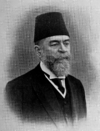1716 Kurum Ash-Sharqia general election: Difference between revisions
(pictures) |
(corr) |
||
| Line 42: | Line 42: | ||
| leaders_seat3 = | | leaders_seat3 = | ||
| seats_before3 = 18 | | seats_before3 = 18 | ||
| seats3 = | | seats3 = 23 | ||
| seat_change3 = {{increase}}5 | | seat_change3 = {{increase}}5 | ||
Revision as of 15:13, 21 February 2023
| |||||||||||||||||||||||||||||||||||||||||||||||||||||||||||||||
| |||||||||||||||||||||||||||||||||||||||||||||||||||||||||||||||
| |||||||||||||||||||||||||||||||||||||||||||||||||||||||||||||||
The 1716 general election was held in Kurum Ash-Sharqia to elect the 6th session of Al-Majlis Al-Watani. The election was held on the 20th day of 1716 AN. 100 seats in Al-Majlis Al-Watani were up for election.
Al-Majlis Al-Watani was dissolved by the Sultan when the cabinet lost its parliamentary majority after a vote of no confidence. The Socialist Platform withdrew its support for the Secular Alliance led coalition. Several days before, Grand Vizier Mohamed Van de Vijver declared his intention to go ahead with constitutional reform and remove religious references from the constitution, in spite of their coalition partner's reluctance.
Mohamed Van de Vijver's cabinet was in office for little more than one year. The Secular Alliance lost 8 seats. Not necessarily because voters became less secular, but because the Secular Alliance was unable to deliver. Many voters moved to the Socialist Platform, gaining 5 seats.
The Islamic People's Party gained seats for the first time in 8 years. A year in the opposition convinced voters to return, as well as the perception that the IPP is a steady factor in Kurum Ash-Sharqian politics, as opposed to the Sec.A.
| |||||||||||||||||||||||||||||||||||||||||




